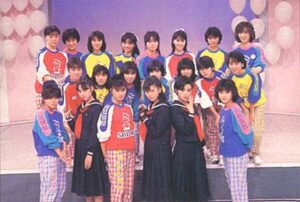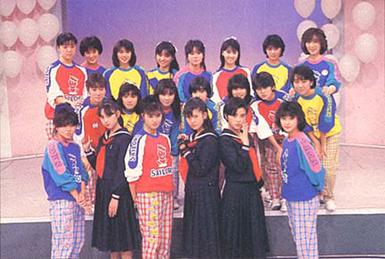This week, we’re talking about the birth of the idol industry in Japan. What are idols, how are they made famous, and what does all of this say about the nature of consumer culture in modern Japan?
Sources
Galbraith, Patrick W and Jason G. Karlin, eds. Idols and Celebrity in Japanese Media Culture.
Ni, Jindan. The Tale of Genji and its Chinese Precursors: Beyond the Boundaries of Nation, Class, and Gender (this was the thing I had to read in grad school about comparisons between AKB48 and women in the Heian Period)
Ian Martin’s fantastic article on the golden age of kayokyoku music for the Japan Times.
An article about Nishino Miki and mental health in AKB48 from Japan Today.
Images






One thing that you might find interesting is a current docuseries called The Flowers of Passion that focuses on the underground idol scene which is. The actual narrative of it is a bit amateurish at times but the real meat of it anyway is the idol interviews. In terms of firsthand accounts from a wide variety of performers who are currently active in the scene it’s undoubtedly a great resource for anyone who’s interested in that stuff. And hey, Patrick Galbraith also shows up in it.
There’s also a series of articles called The Idol Suicides by Osada Sokichi (currently producer for the male/female idol duo Cinema and Boy CQ) which isn’t actually about suicide at all but the realities of producing for and working with an underground idol group and the underground scene in general.
https://www.homicidols.com/tag/the-idol-suicides/
The underground scene is, in a way, an entirely different beast from the groups like AKB48. It’s the scene that birthed the infamous BiS after all. As the article gets into it’s a scene where you can have performances that are shocking or messages that might seem bizarre or corny but have a cute young woman deliver them and there’s an acceptability to it and that it’s, in essence, a scene that embraces and celebrates the idea of youthful irresponsibility (though of course the performers are anything but irresponsible, many are young adults with very real world worries) and it’s that same mindset (and economic realities) that also makes it a highly ephemeral scene where a group or performer can be going strong and then disappear suddenly.
As of 2/25 Age of Samurai is now available on Japan Netflix as well, including with Japanese or Portuguese overdub. Subtitles are available in English, Japanese, Portuguese, Korean, or Simplified Chinese.
Hi! Long time listener, but first time commenter.
This has been a very good episode, though when talking about Idol shaving their hair, the first thing that comes to my mind is Aya Hirano’s incident. Aya Hirano is the voice actress to Suzumiya Haruhi which was one the most powerful anime in anime fandom. Aya Hirano herself is a very successful idol at the time. To cut story shot, just like AKB48 example, one day people finds out that Aya has a boyfriend (or at least close to a man). This lead to her getting attacked online and real life, and end up with her apologize and shave her hair. It was truly one of the most shocking, frightening, and disgusting event in idol community that will always taint how I view that community.
Shifting in to different topic. While I agree that Hatsune Miku is the one and only virtual idol, in the sense that her singing is purely computer generated, I think a new type of idol that merge the virtual sense of Miku and idol group of AKB has emerge. Perhaps you’ve heard it, or perhaps not, it is called VTuber.
Virtual Youtuber (that is YouTuber who use 3D anime avatar) was popularized by Kizuna Ai around 2018-2019 (I think. Probably earlier than that to be honest, I was finishing my master degree at that time, so my memory of non-academic events blurred). Since then several waves of VTubers have appeared and right now two groups are dominant: HoloLives and NijiSanji.
VTubers are interesting development for Idol Groups because they are more crass, blunt, honest, and even vulgar than your typical idol. Its like if you combine Idol Group and YouTuber, dress it with anime avatar, and voila! A new kind of Idol has born.
It still has the trapping of Idol (such as no official relationship, people “graduating” from being Idol, songs, A LOT of songs, etc.) but I think because they play character, and not exactly their own real life identity (even if their real life experience seeps through their performance), it allows for an even more “intimate” interaction between idol and fans.
I think this is a very interesting recent development that kinda miss from this episode. Maybe one day you can revisit this topic with VTuber in mind. But then again VTuber is a still dynamic scene, with drama and achievement that are still unfold. So maybe in the end they move too far away from Idol environment, and not exactly fitting for this episode.
Still, I believe this is a worthy addition to be researched (or at least, a curious glance) when talking about Idol.
Though I need to make a disclaimer here, I am an Indonesian, so I kinda bias about VTuber because both HoloLives and NijiSanji open branch in Indonesia, ahead of any other branch (like China or English), so it will always has a special place in my mind.
I am sorry for rambling so long. Hopefully what I am talking make sense. Thank you.
Interesting, thanks! I didn’t know anything about the history of idols. I was never into the idol thing either. However, just one point I’d disagree with you on — when you say virtual idols are a one-off aside from Hatsune Miku. The Virtual YouTuber/VTuber phenomenon out of Japan has really blown up in the last few years, with real people controlling anime avatar rigs in real time usually while streaming games, singing, drawing, talking to fans in chat, etc. It seems to have strong ties to old idol culture as well, with a few big VTuber agencies managing talents and even some ads and branded products.
I don’t know how much of this is considered a niche thing in Japan when compared to “real” idols (and in fact the whole “we’re idols” thing seems to be a bit of a joke, with a few of them being very explicitly dirty-minded.) But for what it’s worth, the movement has spread to the West somewhat, with a lot of independent VTubers around and a few English-speaking VTubers gaining a lot of popularity here, though still mainly among the anime/Japanese game fan set over here. Still, something interesting to keep an eye on. I have to admit I’ve lost some hours watching their clips on YouTube.